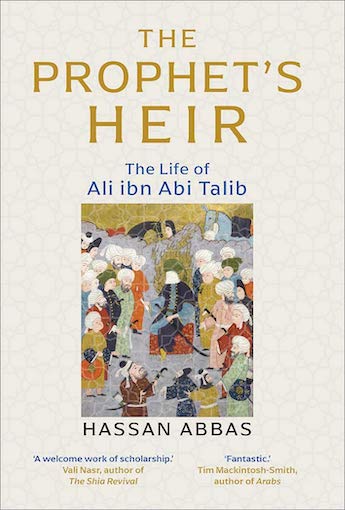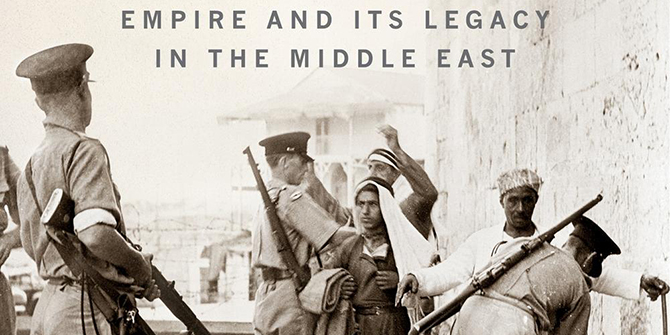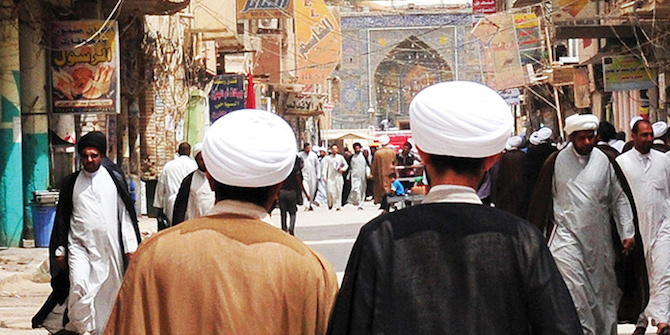by Geneive Abdo
In an elegantly written narrative, filled with intriguing detail, Hassan Abbas has brought to life a central figure in Shi’a Islam, who holds great relevance today in countries such as Iraq. Geneive Abdo, author of The New Sectarianism: The Arab Uprisings and the Rebirth of the Shia-Sunni Divide, reviews for the blog.
When the Arab uprisings began in the Middle East in 2011, Western media outlets were quick to label them ‘secular’ protests launched by ‘secular’ youth. In particular, these characterisations were used in the case of Egypt, when a counter-revolution inspired by the country’s military establishment toppled the Muslim Brotherhood in 2013. That uprising, too, was labeled ‘secular.’
Similarly, the Iraqi protest movement, which erupted on a massive scale in November 2019 and continues today, reveals the pitfalls of characterising an Arab youth movement as ‘secular’ simply because its supporters want secular states. In fact, during the early months of the rebellion, the protest leaders met regularly with clerics, or marjiyya, in the holy city of Najaf to enlist their support. Ayatollah Ali Sistani, arguably the most influential cleric for Shi’a Muslims in Iraq and beyond, repeatedly voiced his support for the protesters’ demands, which included an end to corruption among the Shi’a political elites who run the government. Over the last two years, there has been a tacit alliance between some clerics and the protesters against the Iraqi state.
Iraq’s protest movement, comprised mostly of Shi’a youth, also defies the notion that a nationalist movement can only exists in a frame that does not include religion or religious Muslims. The most common chant of the protesters is ‘We want a homeland,’ even as the same demonstrators waved banners of Imam Hussein. Shi’a around the world hold Imam Hussein and the other companions and successors of the Prophet Mohammad in high esteem –whether they self-identify as secular or religious Muslims.
Thus, the great value of The Prophet’s Heir: The Life of Ali ibn Abi Talib, an historical biography written by Hassan Abbas, a professor at the National Defense University in Washington, DC, and published by Yale University Press. In an elegantly written narrative, filled with intriguing detail, Abbas has brought to life a central figure in Shi’a Islam, who holds great relevance today in countries such as Iraq. Abbas’ central message is that Ali was a man of peace and tolerance, of self-sacrifice and modesty. Once he became the fourth caliph, after being passed over several times, he instituted a period of social justice at a time of profound corruption in the Arabian Peninsula.
Imam Ali ibn Abi Talib, one of the four rightly guided caliphs, or rashidun, was raised by the Prophet from a young age and was his closest confidant. He is considered by many to be one of the most important spiritual leaders for Shi’a Muslims. For some in the West, Ali is considered the greatest warrior during the time of the Islamic conquests, when the faith was spread in the Arabian Peninsula. But little is known about Imam Ali’s life and his relationship with the Prophet, who was also his cousin and father-in-law, aside from impressions of his military acumen.
Author Hassan Abbas is a devout Shi’a Muslim whose command of the extensive Shi’a literature informs this entire work. This provides both a fascinating and extremely useful look at the Shi’a worldview and historical experience, but also opens the door to a better understanding of contemporary religious, social, and political trends among the world’s estimated 200 million Shi’a believers, who constitute ten percent of all Muslims, and their relationship to the majority Sunni Muslim community. And it serves as an important corrective, or counterweight, to the Sunni narrative of the Muslim world’s religious and social history – and to the predominant Western scholarly approaches and political views that this Sunni vision has informed for centuries.
Abbas lays out his motivation for writing the book in its opening pages: Although Islam has excelled in many ways over the ages, including in the arts and sciences, ‘it’s various strains, with their peculiar political manifestations, today present a confusing picture. For a lay observer, Muslim history is quite puzzling in this sense.’ He goes on to say that his book is an attempt to ‘set the record straight,’ by narrating the history of Islam through the Shi’a legacy of Imam Ali.
Thus, the author sees the work as a way to bridge the sectarian divide. And a case could be made that Shi’a-Sunni tensions could be receding, at least from the recent high-water mark of the ISIS era, which Muslim minority communities across the region, most notably the Shi’a, rightly saw as a direct existential threat. The retreat of Sunni Islamist forces in Syria and, now, the ‘Iraq for all Iraqis’ slogans emanating from the Baghdad, would seem to bolster this sentiment.
However, the long saga of Sunni-Shi’a rivalry and tensions, across a range of social, political, and theological issues suggests we could be experiencing simply an episodic easing in sectarian dynamics, ready at a moment’s notice to revert to the historical mean of outright conflict. Surely, the aggressive behaviour of both Sunni-dominated Saudi Arabia and Shi’a-ruled Iran, the leading patrons in what has been a string of proxy sectarian struggles – Syria, Yemen, Iraq, among others – gives little cause for optimism.
Abbas’ biography offers hope that intra-Muslim rivalries perhaps cannot be resolved, but at least contained. More importantly, his work – which is perhaps the first in-depth treatise of Imam Ali written in English — is a contribution to the study of Shi’a Muslims. The primary sources for scholarship on the life of Ali are the hadith and the sirah literature (accounts of the Prophet Mohammad life) as well as other biographical sources and texts of early Islamic history.
At least for the last thirty years, when academia in the West took a fancy to the study of what was termed ‘political Islam,’ the field was largely analysed and studied through the prism of Sunni Muslims. The Shi’a experience, both historical and modern, was viewed narrowly through the study of the 1979 Islamic revolution in Iran, which brought to power the first Shi’a theocracy in history. Sunni Muslims are often credited for Islam’s successes while also associated with the violence committed by some Sunni extremist groups, such as Al Qaeda and ISIS.
Since the 2003 US-led invasion of Iraq, however, when a Shi’a government came to power, Shi’ism caught the attention of the Western media and scholarship; a journalist at the Washington Post, in fact, was the first to identify a ‘Shi’a crescent,’ meaning that Shi’a Muslims were experiencing an ascendence in political and religious life. But still today, Shi’ism remains far less understood than the Sunni tradition. ‘Western historians now acknowledge that modern Western scholarship on Islam has primarily relied on major literary sources of Sunni Islam and consequently adopted that perspective with its attendant political biases,’ Abbas writes. ‘Shia Muslim perspectives, on the other hand, were often unfairly projected as opinions of disgruntled Muslims who vilified companions of the Prophet and cursed them.’
In Abbas’s biography, Ali is anything but a disgruntled Muslim seeking revenge upon his detractors. Much about his life suggests his exceptional forgiveness of others, even after he was passed over three times before being acclaimed the fourth caliph, as well as his modesty, and his unfaltering loyalty to the Prophet, which also included serving as the Prophet’s scribe because the latter was illiterate. Even from birth, Ali appeared special. As tradition holds, he was born in the Kaaba in Mecca, the only person ever born there. As soon as Ali was born, the Prophet Mohammad, who was thirty years old at the time, took him in his arms, Abbas writes.
The relationship from that moment flourished, Abbas writes. When Ali was five years old, the Prophet adopted him because Ali’s own family was too poor to care for all their children. From then onward, Mohammad relied upon Ali for support, protection, and his intellect, as he faced unprecedented threats from polytheists who rejected his prophecy. One of Ali’s chief responsibilities was writing down the divine revelations. Each verse of the Koran was entrusted to Ali’s hand, and he would write it down, according to the Prophet’s interpretation.
As Ali grew older, he became fearless in confronting Mohammad’s enemies. Around 620 CE, the enemies of Islam in Mecca were plotting to kill the Prophet as he slept. This story is famous in Islamic history. The plotters were members of the Quraysh tribe, a merchant clan in the Arabian Peninsula during the seventh century. They controlled Mecca. Mohammad had been born into the tribe but was expelled, after he began preaching about Islam and monotheism – a direct threat to the political commercial interests of the polytheist Quraysh.
Once the plot was known, Ali agreed to sleep in Mohammad’s bed and face the Quraysh, who were determined to kill Mohammad. When the men broke into Mohammad’s house and went into Mohammad’s room, Ali rose from the bed and attacked them instead. Abbas writes: ‘Ali was not afraid, as shielding Mohammad from threats has been ingrained in his character since childhood. This was the moment he had been practicing for all his life.’
Perhaps one of the few criticisms of Abbas’ well-researched and captivating biography is his reliance on over-the-top observations which seem impossible to prove. For example, in this section of The Prophet’s Heir, Abbas writes at length of Ali’s bravery and his commitment to protect the Prophet. This fact is well-established in many other sources of Islamic history. But then Abbas takes it up a notch, writing that because Ali was fearless as he waited for Mohammad’s attackers, ‘Ali slept more soundly than he had ever slept in his life.’ Such hyperbole leaves Abbas vulnerable when faced with critics who challenge his use of traditional Shi’a sources and cast doubt on his version of Ali’s life and his broader messages about Islamic history.
One of the greatest contributions Abbas makes to existing literature is his chapter on Ali’s reign as the fourth caliph of Islam. Some academic research has presented Ali as the first to conceptualise citizens’ right in Islamic political thought. He believed Islamic society should be governed not only by a competent figure who has knowledge of divine laws but one whom the society accepts as their guardian.
Abbas writes that, as a starting point, Ali insisted that his appointment as caliph be a transparent process. And he applied this same philosophy to creating a just state after he took office. Abbas quotes one of Ali’s first addresses to the people: ‘O Muslims! You have given me your pledge of loyalty and I know that you have not done so without forethought… I want to mobilise you for obedience and service to God; but many among you are hoping that I will give them rich estates or high ranks in the government. This is something that will not happen.’
During his rule from 656–661, Ali began by announcing that anyone who abused public funds and diverted funds from the state treasury to build large estates would be punished. Similarly, expensive lifestyles would be discouraged. During the first week of his rule, according to Abbas, Ali’s representatives began confiscating land and assets that had been awarded by previous leaders to curry favour among the elite of the new Muslim society. Disturbing the system of cronyism caused some to regret they had supported Ali for caliph.
As part of his mission to create an egalitarian society, Abbas writes, Ali’s second major action was to distribute treasury funds to the downtrodden. In doing, he nearly emptied the state treasury and less money was given to the wealthy, which caused anger among some in the community. Many officials who lost income from the treasury wasted no time fomenting a coup against Ali, according to Abbas’ account, and they enlisted Aisha, the Prophet Mohammad’s widow to lead the campaign. Abbas chronicles the battles that ensued between these two forces in what is modern-day Iraq and other places. Eventually, Ali’s right-hand man was assassinated in Egypt, and Ali himself was killed as he prayed one morning in 661 in the grand mosque in Kufa, Iraq.
Abbas writes that after Ali’s death, it was a long time before peace returned to Islam. In fact, the conflicts among the Muslims in the seventh century eventually led to the split within Islam, which resulted in the Sunni and Shi’a traditions. The meaning of the world Shi’a, in fact, is ‘the partisans of Ali,’ those who reject the legitimacy of the first three caliphs and believe Ali was the only rightful heir to the Prophet Mohammad. Abbas concludes that each sect, Sunni and Shi’a, have their own extremists who challenge core Islamic beliefs. And, he acknowledges that sectarianism does exist today, but he writes that for many Muslims sectarian identity is a label and he notes how Sunni and Shi’a often commemorate their respective Islamic rituals together in the same shrines.
For Abbas, the life of Ali should be an example for the Muslim world today. Ali’s legacy should be a guide to curb absolutist views within Islam – what Abbas calls ‘the modern crisis of religious fanaticism’ – as well as a guide for all of humanity. ‘This is where Ali’s legacy makes its mark,’ writes Abbas. ‘Shia or Sunni ultimately matter little – his power remains in his ability to touch the hearts of people of all times and places, the eternal friend and teacher.’
Wars and conflicts have defined the Middle East for many decades. Although Abbas’ beautifully written prose and fascinating portrayal of Ali’s life could be an example of peace and reconciliation, it is unlikely to change the modern-day dynamics in some predominately Islamic states. However, Abbas’ literary contribution in this extraordinary work is instructive in understanding the modern-day complexities of the conflicts in the region and beyond.







